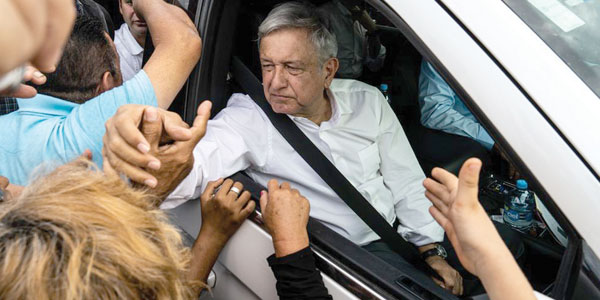
By Jorge Ramos
Being a journalist is a true privilege. In one week alone you can see the best and worst of a nation, as I did recently during a trip to Guadalajara, Tijuana and Mexico City. What began as a celebration of books ended with a reminder that deep inequality endures in Mexico.
There’s nothing quite like walking amid stacks of books today. In an increasingly digital world, the scent of bound paper pages is almost nostalgic. This is why the Guadalajara International Book Fair is, undoubtedly, one of the best events Mexico hosts each year. In a labyrinthine convention center, culture, the past and the present are gathered together and celebrated. The biggest problem is finding a bag big enough to fit all the books you want to take away with you, to read in the coming months.
While I was there, leafing through (and smelling) the books, I recalled an interview that I conducted in 2006 with the indispensable Carlos Fuentes. “This is a country with a very strong civil society, with a very strong culture, and one that has been putting democracy into practice through a myriad civic organizations,” the writer told me. “There’s a civic culture that has been developing underground. This country has a long-standing tradition of exercising democracy, which, despite its not always having manifested institutionally, has certainly been exercised on the popular-culture level.” Mexico is truly a rich country.
I left Guadalajara recharged, then headed to Tijuana, where Central American refugees continued to arrive in the border city. These desperate migrants are fleeing gang violence, corruption and extreme poverty, and criticizing them for doing so is absurd. When these refugees, most of them from Honduras, started their journey as a group, they did so because they could get closer to the United States in relative safety without having to pay thousands of dollars to smugglers.
I have been following them since they crossed the border from Guatemala into Mexico, and I’ve rarely witnessed such personal sacrifice. I recently spoke with a single father, 27 years old, who pushed his 7-year-old daughter in her wheelchair, or carried her, for hundreds of miles. The child had suffered a stroke, and her father wanted to see if she could get medical treatment in the United States. He had already entered the country previously.
During a recent storm in a camp where refugees were staying in Tijuana, makeshift plastic roofs were no match for the rainfall. The few belongings people had brought with them were soaked. Children were sick. People went without shoes. All this just a few yards from the U.S. border, which had been almost entirely sealed by President Donald Trump.
Most of these migrants have been relocated to a shelter with a roof and better conditions. Others are taking their chances and jumping the border fence, returning to their own countries or exploring their options for a new life in Mexico. Thousands of Mexicans have helped them along in their journey with clothes, food, transportation and encouragement. But I’m still haunted by the xenophobic cries and insults I heard hurled at the migrants in Tijuana. Xenophobia has no place in a country that has been exporting immigrants for decades.
From there I went to Mexico City, to the inauguration ceremonies for Andrés Manuel López Obrador. The new president was elected by more than 30 million Mexicans seeking change, and it can already be felt. Still, some people are beginning to test the limits of this new administration, though many give López Obrador the benefit of the doubt.
As a symbol of this change, I have to mention the opening of the president’s home, Los Pinos, an estate much larger than the White House, to the public. There’s nothing like seeing firsthand the luxurious, eccentric and out-of-touch lives former Mexican leaders have lived at the expense of the taxpayers. Is it really necessary to have a private movie theater? And a bunker? Not-normal is the new normal.
That’s how I saw the three Mexicos in one go.
______________________________________________________________________________________________
Los Tres Méxicos
Esto de ser periodista es, muchas veces, un verdadero privilegio. Puedes ver lo mejor y lo peor de un país en muy poco tiempo. Así, en una semana, viajé de Guadalajara a Tijuana y, de ahí, a la ciudad de México. Y lo que empezó como un homenaje al libro terminó en un monumento a la desigualdad. Les cuento.
No hay nada como caminar entre montañas de libros. En un mundo cada vez más digital, donde los libros se están convirtiendo en pantallas, hay algo casi nostálgico en el olor a papel. Por eso la Feria Internacional del Libro en Guadalajara es, sin lugar a dudas, una de las mejores cosas de México. Resume — en un laberíntico centro de convenciones — la cultura, el pasado y las ideas que se nos han ocurrido a los mexicanos en los últimos años.
Ahí, tocando (y oliendo) libros, recordé una entrevista que le hice en el 2006 al indispensable Carlos Fuentes. “Este es un país con una sociedad civil muy fuerte, que tiene una cultura muy fuerte y que ha venido practicando la democracia en mil agrupaciones cívicas”, me dijo. “Hay una cultura cívica que se ha desarrollado subterráneamente. Este país tiene una larga tradición de ejercicio democrático que, si no se ha manifestado siempre en la altura institucional, sí se ha ejercido a la altura de la cultura popular”. Qué rico es México.
El principal problema que uno tiene en la feria del libro es conseguirse una maleta suficientemente grande para llevarse todo lo que quieres leer en los próximos meses. Y ese es, digamos, un buen problema.
Bien leído y recargado llegué a Tijuana a cubrir la llegada de las caravanas de refugiados centroamericanos. Esto es lo que ocurre cuando gente desesperada toma decisiones desesperadas. Están huyendo de la violencia de las pandillas, la corrupción y la pobreza extrema. Imposible culparlos.
Los vengo siguiendo desde que cruzaron la frontera de Guatemala con Chiapas. Cuando estos inmigrantes, en su mayoría de Honduras, se enteraron que podían acercarse a Estados Unidos, relativamente protegidos y sin tener que pagarles miles de dólares a los coyotes, se pusieron a caminar.
Pero pocas veces he visto sacrificios tan grandes. Acabo de entrevistar a un padre soltero de 27 años de edad que ha empujado y cargado por cientos de kilómetros la silla de ruedas en la que viaja su hija, de 7 años de edad y que sufrió un derrame cerebral. Busca tratamiento médico para su hija y ya cruzó a Estados Unidos.
Fue frustrante e indignante ver cómo quedó el albergue Benito Juárez en Tijuana después de un aguacero. Los improvisados techos de plástico no aguantaron y las pocas pertenencias que trajeron los refugiados quedaron totalmente empapadas. Había niños enfermos, gente sin zapatos y, a unos metros, una frontera casi sellada por el presidente Donald Trump.
La mayoría de los inmigrantes ya han sido trasladados a otro albergue, con techos y más protegido. Otros se están saltando el muro, regresando a sus países o explorando una nueva vida en México. Miles de mexicanos los han ayudado durante todo el trayecto con ropa, comida, transporte y dándoles ánimo. Pero me brincan los gritos e insultos xenofóbicos que escuche de algunos, pocos, en Tijuana. Eso desafina en un país, como México, que ha sido exportador de inmigrantes por décadas.
Y de ahí me fui a la ciudad de México a la toma de posesión de Andrés Manuel López Obrador. Más de 30 millones de mexicanos votaron por un cambio, y ya se siente.
Pero, más que nada, ahorita nos estamos tanteando. Tantear es una palabra maravillosa y aplicadísima en estos días en México. Estamos conociendo los límites del nuevo gobierno y, en algunos casos, se está ofreciendo (temporalmente) el beneficio de la duda.
La política es brutal. Nadie está más solo en México que un expresidente. Pero para simbolismos me quedo con la apertura al público de la que fuera la residencia oficial de Los Pinos (con una superficie 14 veces más grande que la Casa Blanca). Nada como ver, con tus propios ojos, la desconexión, los lujos y excesos de los exgobernantes pagados, por supuesto, con los impuestos de todos los mexicanos. ¿De verdad era necesario el cine privado y un búnker de guerra? Lo normal ha dejado de serlo.
Así vi tres Méxicos de un jalón.










